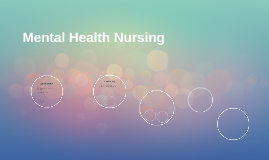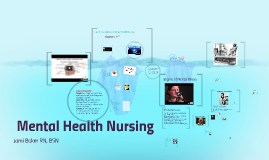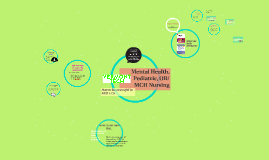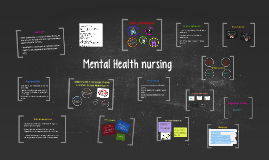Mental Health Nursing
Transcript: Perpetuating Factors No psychiatrist involvement with medication regime No contact with psychologist or GP to encourage healthy coping strategies Chronic pain and illness Postponement of court appearance Sexual abuse/trauma history not being dealt with appropriately Physical health deterioration Low self-esteem and confidence Poor diet, sleep and exercise Poor coping strategies Bullying Grief Sexual Identity Panic attacks Body image issues Nursing Goal 1 Risk Assessment 4. Importance of reflective practice References Precipitating Factors Take Home Lessons 2. Value of a methodical approach to assessment Predisposing Factors MSE Suicide attempt at age 15 (overdose) Chronic health concerns: neuromyelitis, lupus and rheumatoid arthritis. Causes pain and had a terminal diagnosis at age 8 Undergone several rounds of chemo and therapy, some resulted in her having pneumonia 17x, and being in a coma for a week History of sexual abuse (step-grandfather from ages 3-13; best friends dad from age 15-18 Biological mother committed suicide when aged 15 Abandoned by biological father when born Unresolved grief Poor sleep, eating and exercise regime Body image issues Low self-esteem Family history of mental illness Anxiety 5. Self care to avoid compassion fatigue and vicarious trauma Plan/Recovery action plan Nursing Goal 3 Other Nursing Goals Positive Factors We acknowledge the Traditional Custodians of the land on which we live, work and study: the Gubbi Gubbi people. We pay respect to local Indigenous Elders past, present and emerging and recognise the strength, resilience and capacity of all Aboriginal and Torres Strait Islander people. Access to health care professionals (neurologist, psychologist, psychiatrist and GP once organised in the community) Supportive Aunty, stepparents and step siblings Close group of friends Insightful Community supports (such as sexual abuse support group, suicide hotline) 3. Feeling comfortable talking about the uncomfortable Implementation of Case Formulation in Mental Health Nursing Fear and anxiety over court case being postponed with no date being provided, when already not wanting to go ahead with trial Fear, anxiety and stress relating to physical health concerns (MRI +/- chemo) Emotional needs not being met Chronic pain Traumatic history Prejudicial childhood involving chronic sexual abuse Poor coping mechanisms in place Presenting Issues Complete a formal recovery plan with Monica Develop a safety plan with Monica and her step-mother and document in the care plan Complete a care plan Involving social worker to discuss up coming court case and access to government payments Discussion with treating team regarding recommendations of therapies and psychologists to see in the community Providing a safe environment removing access to means Encourage avoiding making decisions at this point in time, until MS improved 19 year old female Chronic depression, presenting voluntarily for suicidal ideation and thoughts of self harm Chronic physical pain due to illness (neuromyelitis for which she is considered terminal; lupus and rheumatoid arthritis). Needs further investigations +/- more chemotherapy Unresolved trauma surrounding mothers suicide Court case regarding sexual assault has been postponed due to COVID 19, with no date provided Moved from Brisbane to Sunshine Coast due to COVID 19, resulting in a loss of community GP and psychologist support as well as being isolated from friends Insomnia due to night terrors regarding sexual assault and court case, as well as physical health nightmares Father who abandoned her when she was a baby now wants to start a relationship with her 1. Importance of a therapeutic relationship Case Formulation - what is it? Case formulation involves turning a consumer's narrative and all of the information collected from interviews and reports into a coherent story to help develop a treatment plan (Henderson & Martin 2014) Evidence suggests that case formulation can impact on therapeutic relationships, the clinicians understanding of the consumer and the overall health outcomes of consumers (Hartley et al 2016) Nursing Goal 2 Monica Australian College of Mental Health Nurses, ACMHN. (2010). Standards of Practice in Mental Health Nursing. Australia: ACMHN. http://www.acmhn.org/publications/standards-of-practice Cahill, J., Paley, G. & Hardy G. (2012). What do patients find helpful in psychotherapy? Implications for the therapeutic relationship in mental health nursing. in Journal of Psychiatric and Mental Health Nursing, vol 20, 9. https://doi.org/10.1111/jpm.12015 Hartley, S., Jovanoska, J., Roberts, S., Burden, N., & Berry, K. (2016). Case formulation in clinical practice: Associations with psychological mindedness, attachment and burnout in staff working with people experiencing psychosis. Psychology & Psychotherapy: Theory, Research & Practice, 89(2), 133-147. doi:10.1111/papt.12074 Juan David Palacio, M. D. M. S. (2017). IACAPAP Textbook of Child and

















